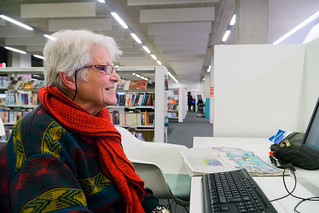The Digital Citizen Project: Get Online, Stay Connected
Libraries NI is the largest public library authority in the UK and it provides library services for people in communities right across Northern Ireland. The size and reach of the organisation means that it is uniquely placed to address digital exclusion issues, particularly in rural areas and in areas of deprivation. Libraries NI’s Digital Citizen Project, which is funded by the Northern Ireland Department for Communities (DfC), delivers digital learning opportunities across the network of 96 branch libraries while also reaching out to many in their own communities.
What is a Digital Citizen and The Digital Citizen Project?
A Digital Citizen has the skills required to use digital technology purposefully and confidently to communicate, find information, purchase goods/services, problem solve and create. In September 2018, with funding from DfC, we launched The Digital Citizen Project to help people develop and learn the skills needed to become a Digital Citizen.
The project came in response to research by Citizens Online on the digital landscape in Northern Ireland which showed that 18.8% of the population have never used the Internet while 32.2% of the population aged 16 - 65 years have limited or no digital skills.1

The importance of the library network
Through The Digital Citizen project, we have demonstrated that libraries are uniquely positioned between communities and government to help adults improve their:
- Safe use of online services
- Health through improved skills and communication
- Personal confidence and problem-solving skills.
We targeted adults in rural areas, areas of significant deprivation (neighbourhood renewal areas), adults with disabilities and retired and older people.
The delivery model (or how did we do it)
Six trainers located throughout Northern Ireland were tasked with the provision of the learning opportunities in libraries and outreach locations.
This team delivered free tailored training programmes as well as group and one-to-one support sessions which were all promoted as eClinics.
Having specific geographical areas allowed the trainers to link up with groups and individuals to establish a working relationship to effectively see what their needs and their preferred learning styles were. This allowed engaging content relevant to specific groups and members of local communities based on what they needed to increase their digital skills.
This agile approach also allowed sessions to be delivered, ordered and structured in a way that met the needs of the community and offered a link to their local library where further learning opportunities and resources are always available.
So a key success was the way trainers established relationships with groups and communities. We found the most popular formats were:
- 43% eClinics: phone settings, e-Mail, password help
- 22% Group Sessions: introduction to the iPad, scam awareness
- 35% Short Courses: taking and editing photos on an iPad, keeping yourself and your kids safe online – privacy and security settings
Outcomes
The project exceeded the targets and we know a major part of the success was in the flexibility of delivery and targeted outreach.
Between October 2018 and August 2019 a total of 926 sessions were delivered with outreach/community based sessions making up over a quarter of these at 26%.
For the evaluation we followed up with customers and they indicated some additional outcomes/benefits below:
- 23% felt less isolated
- 47% felt enabled to communicate better with family and friends
- 17% felt it impacted positively on their wellbeing.
The stories however really highlight the key successes of the project and the real impact on the individuals who received training. Below are some testimonials from those who were part of or participated in the training programme:
'The iPad course delivered by Joanne from Libraries NI, has been a resounding success. Each one of our service users who have taken part, have loved how much fun and how accessible the iPad is. These devices have already helped build their confidence and have taught them the skills they need to learn how to thrive.'
‘Having been through a lot of health problems and feeling isolated - going along to these digital help sessions has really given me a new lease of life. I am now able to go on YouTube and watch ‘how to videos’ which helps me around the house. I also like to listen to music and I was shown how to use YouTube and Spotify. All through a 45 minute ‘eClinic’ sessions.’
By Paul Kelly, Senior Information and Learning Services Manager at Libraries NI
For further information contact us via e-mail at Digitalcitizen@librariesni.org.uk or follow us on Twitter @LibrariesNIDCP
1. https://www.finance-ni.gov.uk/publications/digital-inclusion-research-report
